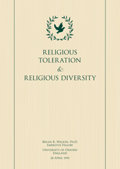Just as some of the new religions have endorsed the modern ethos of the consumer society, acknowledging the pursuit of happiness in this life as a legitimate, indeed, a laudatory goal for mankind, so commensurately they have set forth a changed relation between spiritual living and moral prescriptions. This is one of the facets of change in religion with which the authorities and much of the general public, still caught in the time-warp of traditional Christian moral thinking, have yet to come fully to terms. Yet, it must be obvious that different religions have maintained very different dispositions towards rules of comportment. Religions have varied widely in the nature of the moral rules which they have prescribed, in the vigour and consistency of demands for their application, and in the stringency of the sanctions attached to them. In orthodox Judaism, rules govern the minutiae of ritual and many contingencies of daily life that are totally unregulated in, for example, Christian tradition. In Islam, religious rules affect diverse situations and provide a system of legal regulation for society, at times establishing social control far more stringent, and at other times more lax, than is encountered in Christianity. Thus, the Koran is invoked to sustain, on the one hand, the severe punishments sanctioned for crimes under Sharia law, and on the other hand, the relatively relaxed facilities for men to take up to four wives, and the ease with which they can obtain divorce.
Theravada Buddhism provides a further contrast. Here, there are prescriptions for monks, while a few general rules are enjoined upon the laity. A Buddhist layman’s duty is not to kill, to steal, to lie, to commit wrongful sexual acts, or to drink intoxicants. Beyond this, the Buddha offered moral advice concerning household tasks, behaviour towards friends and care of one’s spouse, but these are exhortations to what might be called social common sense. The individual is urged to be prudent, thrifty, industrious, to be fair to servants, and to choose as friends those who might restrain him from wrong and exhort him to right conduct. Such virtues are, however, enjoined as enlightened self-interest; they are not underwritten by a concept of sin such as is canvassed in Christianity. Disregard of these virtues does not attract special punishments except in the sense of producing bad karma. The religion prescribes no other sanctions, and there is no wrathful deity. Since actions are deemed to determine status in some future reincarnation, good acts are advisable as being in accordance with the eightfold path of enlightenment, since they will lead to re-births in better circumstances, and putatively to the eventual transcendence of all rebirths and the attainment of Nirvana. Thus, while Buddhism certainly teaches ethical values, the individual is left considerable freedom in his moral comportment, and is subject neither to the moral censure nor the threats with which Christian morality is reinforced. In other societies, moral regulation is not derived from explicitly religious roots: for example, the Confucian ethic and samurai code may have informed the moral quality of Japanese society as fully as, or more fully than the various schools of Mahayana Buddhism which function in Japan. One must conclude that there is no normal relationship between a system of religious doctrine and a code of morals. The conjunction of religion and morals in Christianity, the mechanisms by which moral behaviour is enjoined, and the consequences it predicts for the infringement of its moral rules constitute one pattern of relationship, but such a pattern is not typical for other religious systems, and it cannot be assumed, as members of Christian societies have sometimes been disposed to assume, to be a necessary or superior model by which other arrangements are to be judged.





























